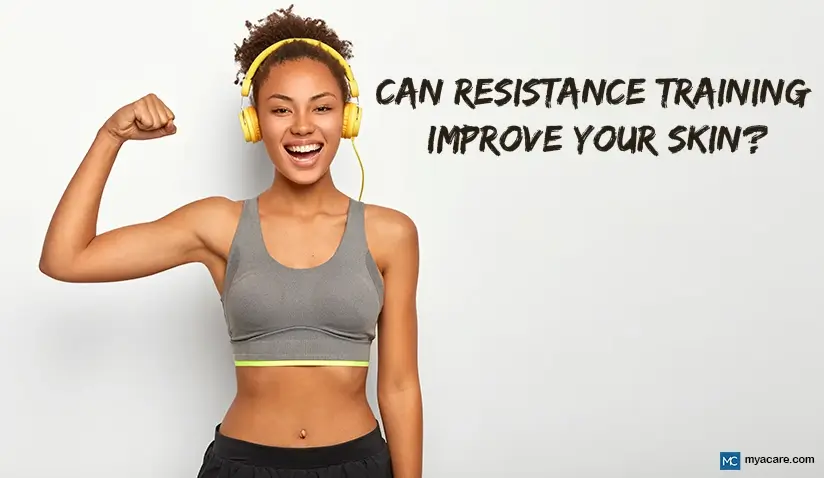Can Resistance Training Rejuvenate Your Skin?

Medically Reviewed by Dr. Rosmy Barrios - August 21, 2024
We all know that exercise is good for health, but did you know that it can also make your skin look younger?
A recent study published in Nature has shown that resistance training, or lifting weights, can reduce skin aging by enhancing the structure and function of the dermis, the layer of skin that provides it with strength and elasticity.
What Is Resistance Training and How Does It Affect Skin Aging?
Exercise that involves tightening your muscles against external resistance is called resistance training (aka when lifting a weight), such as dumbbells, barbells, or your own body weight. It can improve your muscle mass and make you stronger, as well as reduce the risk of developing chronic illnesses, including diabetes, heart disease, and osteoporosis.
It is interesting to note that resistance exercise can also benefit your skin. According to the study by Shu Nishikori et.al., titled “Resistance training rejuvenates aging skin by reducing circulating inflammatory factors and enhancing dermal extracellular matrices”, resistance training can rejuvenate aging skin by lowering inflammatory factors that circulate the skin and by enhancing the skin’s structure and function.
Inflammation is known to cause damage to skin cells. Over a lifetime, the damage accumulates and starts to detract from the skin’s repair mechanisms. This can cause the skin’s structure to become weaker and lead to a flawed complexion with wrinkles and spots. Weightlifting may be a great way to combat these changes and could save you the hassle of opting for cosmetic procedures or age-reversal beauty treatments later in life.
The Study Layout
The researchers Shu Nishikori, Jun Yasuda, Kao Murata, Junya Takegaki, Yasuko Harada, Yuki Shirai & Satoshi Fujita (representing Ritsumeikan University and Frontier Research Center, POLA Chemical Industries, Inc.) conducted a 16-week intervention in 56 healthy, sedentary middle-aged Japanese women living in Kusatsu, Japan. They divided the women into three groups: one group did aerobic training, such as running or cycling; another group did resistance training, such as squats or bench presses; and the third group did no exercise (the control group).
The researchers measured various indicators of skin aging before and after the intervention. These included the elasticity, thickness, and structure of the middle layer of skin or dermis that gives it shape and vitality. Alongside these factors, they recorded the gene expression of dermal fibroblasts, the cells that produce collagen and other structural components. Additionally, they measured the circulating levels of cytokines (inflammatory molecules), hormones, and metabolites in the blood of the participants. However, it is important to mention that the study was carried out in a small group, and more research needs to be done to establish a positive connection between resistance training and how it benefits the skin.
Main Findings: Weightlifting vs. Aerobic Exercise for Improving Aged Skin
The findings of the study show differences between aerobic training and resistance training that suggest weightlifting may be better for aging skin. Here’s what the researchers found:
Genetic Skin Structure Enhancement
The study found that both aerobic and resistance training significantly improved skin elasticity and upper dermal structure compared to the control group.
While results were good for both, resistance training may be superior for enhancing the overall structure of the skin. Unlike aerobics, resistance training improves dermal thickness, which is an important factor in preventing wrinkles and sagging. Moreover, resistance training increased the expression of genes related to the production of structural components in dermal fibroblasts, suggesting that it contributed to better quality skin structure, tone, and shape.
Lower Inflammation and Better Regeneration
The study also found that aerobics and resistance training had different effects on the tested circulating factors:
- Aerobic exercise reduced the levels of inflammatory cytokines, such as IL-6 and TNF-alpha, which are known to accelerate skin aging.
- Resistance Training increased the levels of hormones, such as growth hormone and testosterone, which are known to stimulate collagen synthesis and skin regeneration. It also increased the levels of metabolites, such as lactate and ketone bodies, which are known to activate cellular signaling pathways that promote skin health.
Biglycan and Anti-aging Benefits
Interestingly, resistance training increased the level of a molecule called biglycan (BGN), which is a component of the dermal extracellular matrix. BGN has been shown to have anti-aging effects on various tissues, such as bone, cartilage, and muscle. The researchers speculated that BGN might be a key mediator between resistance training and skin rejuvenation.
Implications and Limitations
This study is the first to show that resistance training can rejuvenate aging skin by reducing circulating inflammatory factors and enhancing dermal structure. It identifies some potential mechanisms and factors involved in the process, such as genes and biglycan production. The findings suggest that resistance training could be an effective anti-aging strategy for skin health.
It should be noted that the study only tested Japanese women, only took measurements from the inner forearm, and only lasted 16 weeks. More research is required to confirm whether the benefits apply to people of all ages and backgrounds, how resistance training affects other areas of skin, and whether the benefits are long-lasting.
How Can You Start Resistance Training for Your Skin?
If you are interested in trying resistance training for your skin health, here are some tips to get you started:
- Before beginning any new workout regimen, speak with your doctor, especially if you have any health issues or injuries.
- Start with low-intensity exercises that use your own body weight or light weights, such as push-ups, lunges, or bicep curls.
- Gradually increase the intensity, frequency, and duration of your exercises as you get stronger and more comfortable.
- Aim for at least two sessions per week of 30 minutes each.
- Rest for at least one day between sessions to allow your muscles and skin to recover and adapt.
- Combine resistance training with aerobic training and a balanced diet for optimal results.
The Takeaway
As per recent studies, resistance training or weight lifting is not only good for your muscles, bones, and metabolism but also for your skin. However, more research needs to be done to establish this correlation. Lifting weights has been shown to reduce inflammation, boost collagen production, and improves skin elasticity.
To search for the best doctors and healthcare providers worldwide, please use the Mya Care search engine.
The Mya Care Editorial Team comprises medical doctors and qualified professionals with a background in healthcare, dedicated to delivering trustworthy, evidence-based health content.
Our team draws on authoritative sources, including systematic reviews published in top-tier medical journals, the latest academic and professional books by renowned experts, and official guidelines from authoritative global health organizations. This rigorous process ensures every article reflects current medical standards and is regularly updated to include the latest healthcare insights.

Dr. Rosmy Barrios is an aesthetic medicine specialist with international work experience. She earned her physician diploma at the Universidad Del Norte’s School of Medicine in Barranquilla, Colombia, and her specialty at John F. Kennedy University in Buenos Aires, Argentina. Dr. Barrios is a member of the Pan-American Aesthetic Medicine Association (PASAM) and the Union Internationale de Médecine Esthétique (UIME). She is an expert health writer with keen interests in aesthetic medicine, regenerative aesthetics, anti-aging, fitness, and nutrition. Currently, Dr. Barrios heads the Regenerative Aesthetics department at a renowned Internal Medicine clinic based in Belgrade, Serbia.
Sources:
Featured Blogs



